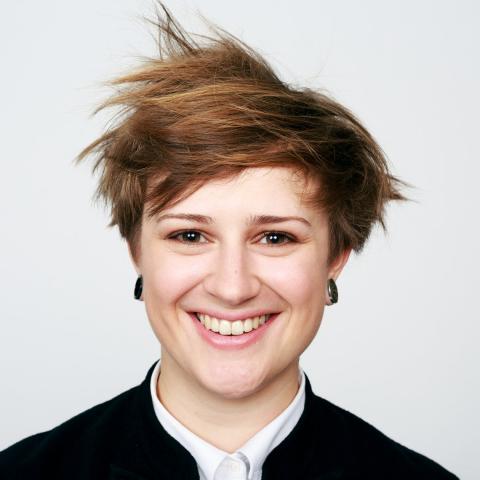 BAFTA/Charlie Clift
BAFTA/Charlie Clift Meet Alex Grahame,BAFTA Breakthrough Brit and artist at Brighton based game development studio, The Chinese Room.
What is your job role and what does it entail?
I left school in 2007 with average grades but excelled at art and graphic design. Art was my passion, but I couldn’t see a stable career in it. I took three years out of education, worked in a variety of jobs and in my spare time I fell in love with video games. After discovering that game development could combine my passion for art into a career, I enrolled in the Computer Arts course at the University of Abertay Dundee. Before graduating in 2014, I started working as a Junior Environment Artist at Brighton based indie studio, The Chinese Room. (Hyperlink - http://www.thechineseroom.co.uk)
How did you start working in the game industry?
As an Artist, I create 3D environments and props for games, 2D concept art and graphic design marketing. The Chinese Room is best known for character narratives and music. I work visually to support both, using the environments, lighting and visual effects to bring the game to life so the player feels a strong emotional connection.
What/who was your inspiration at school?
It was my mum who introduced me to art and would take me to galleries around Edinburgh. Having a close and supportive network of people to expose me to art, culture and new experiences still inspires me to create art today.
Did you have a mentor? Do you have a mentor now?
Since being named as a BAFTA Breakthrough Brit in 2016 I have had the opportunity to be mentored by some of the most influential and well-accredited individuals in the games industry. They help to support me in my career and personal artistic development.
Did you study anything at school/college that you think helps you in your job now?
Whilst at school, studying Art & Design and Graphic Communications was very useful in my career now as a digital artist. I studied fine art, painting, life drawing and other art fundamentals that are essential to becoming an artist, whether in digital or traditional art. What makes a successful artist is an understanding of art theory and how to apply this with any artistic tools.
What’s your favourite part of your job?
The best part of my job is getting to make art every day! I have opportunities to work on a variety of projects and in very diverse artistic styles, from 2D concept artwork to 3D in-game art.
What is the hardest thing about your job?
The hardest part of the job for me is the ‘unknowns.’ Sometimes we need to solve a problem to create something in-game that might have a specific feeling, or we need to find an artistic solution to a technical limitation. Often these briefs are difficult to grasp and understand as they are an ‘unknown’ to the rest of the team as well. We work together and collaborate between departments until whatever the ‘unknown’ was feels resolved to the team.
Can you describe what your average working day is like?
Our current project is our recently announced, So Let Us Melt, a VR title on Google Daydream. I work alongside two other artists to create the artistic style of the game from concept art through to the finished in-game artwork. I also work very closely with other departments such as design, code and audio; collaborating as a tight efficient unit keeps every department moving towards a common goal.
To date, what piece of game art design work are you most proud of and why?
Working on Everybody’s Gone to the Rapture is my proudest artistic work to date. What I most value about the work is the process and journey involved with the rest of the team to develop it. I think the true success of it was down to the love that every single person dedicated to it.
What three tips would you give to Young Game Designers thinking about their game systems for their application?
- Don’t work yourself to a point that is detrimental to your mental health – remind yourself that you have done your best and that you do enough. If you have done your best, then that is all you can do.
- Have more experiences and find passion in a variety of places – visit art galleries, go to museums, learn about history, read, join a sports team, take up photography, travel, or do anything that is away from games. Use your life experiences to influence your artwork and make impactful games.
- It’s okay to take time to work out what you want to do with your future – it’s never too late to pursue a career or a passion that makes you happy.

